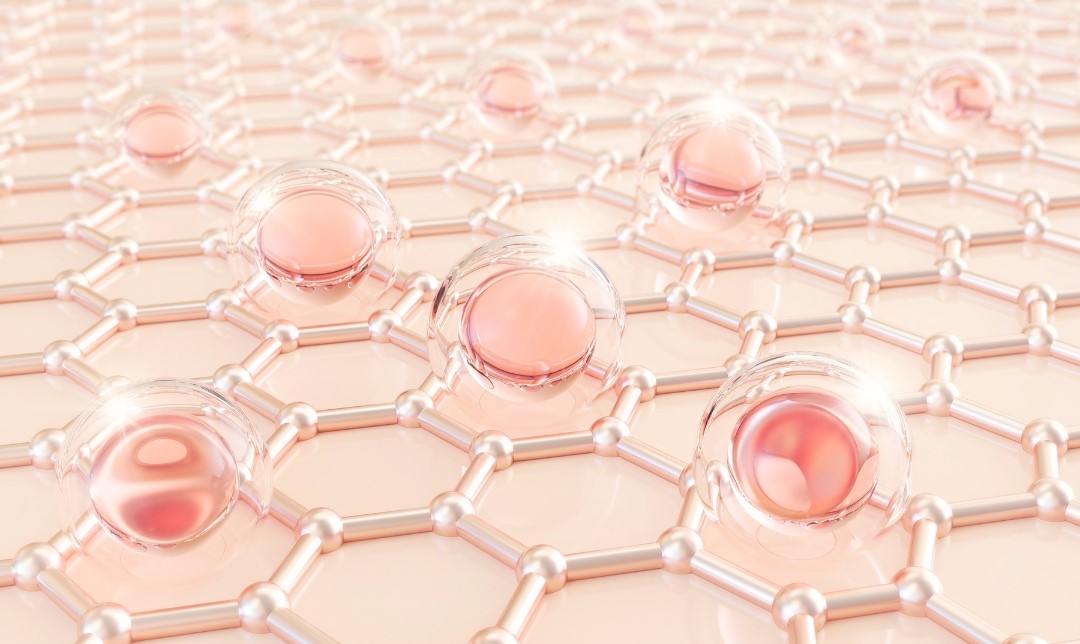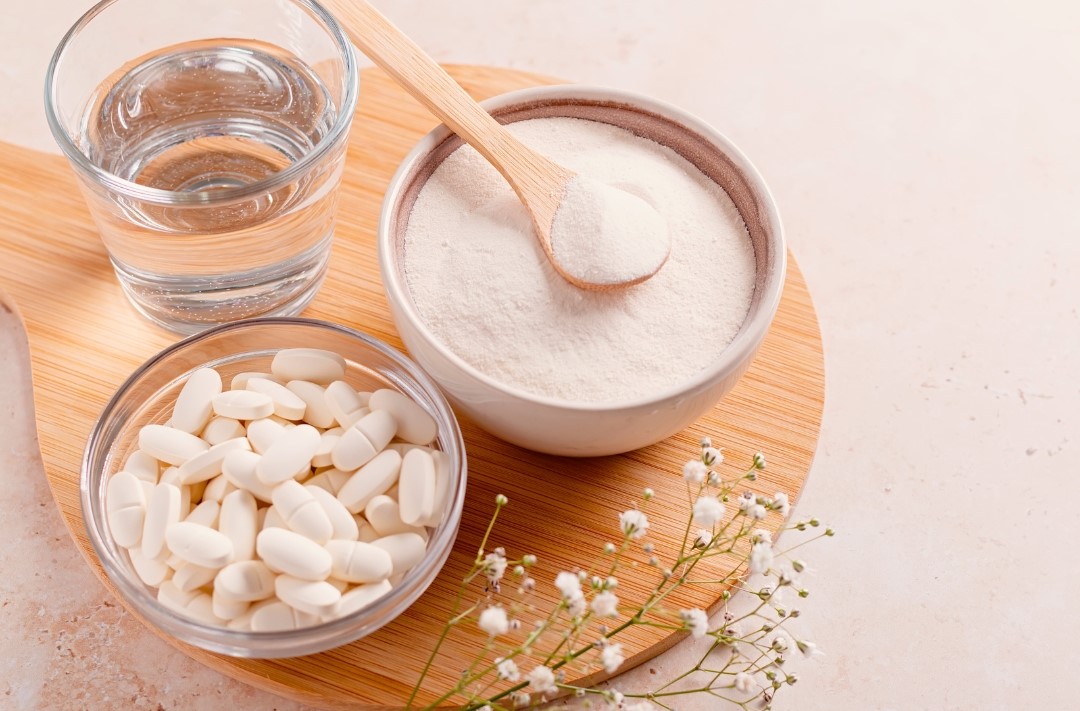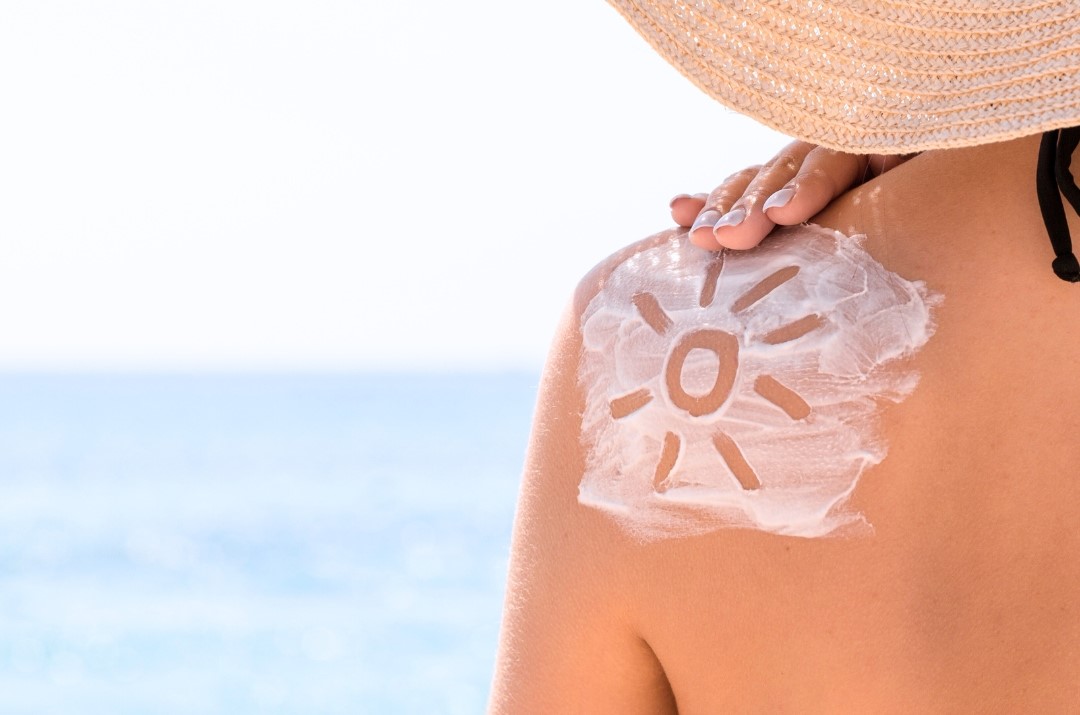
What Collagen Supplements Actually Do for Your Skin
When it comes to healthy hair, skin, nails, bones, and joints, collagen is key. It is the natural building block that keeps your bones and tissues together. It has essential amino acids that help to maintain a strong body while keeping you looking young. Collagen plays a key role in making us youthful and strong. With that in mind, it only makes sense that we would want to do everything possible to boost the body’s natural collagen production. Enter collagen supplements into the scene.
Collagen drinks, pills, and other supplements have exploded into the market. Asia is leading the trend with a demand for collagen supplements that exceeds anywhere else in the world. As their popularity soars, it has left many of us asking the question: Do collagen supplements really work?
Before spending your hard-earned cash at new solutions, it is a good idea to look at the facts behind collagen supplements.

What Is Collagen?
Collagen is the most abundant protein in the human body. In fact, it makes up about 30% of all the protein that you have in your body. It is the crucial element that forms the structural framework for your body and gives strength as well as elasticity to connective tissues. You will find collagen everywhere in your body throughout your skin, bones, muscles, tendons, ligaments, cartilage, blood vessels, and organs.
Collagen molecules come together to form long, fibrous bundles called collagen fibrils, which give structural integrity to your body parts. While there are 16 types of collagen in the human body, around 90% of all that collagen in your body is either Type I, II, or III.
Type I collagen is found in scar tissue, ligaments, tendons, organ surfaces, bone, and skin. This is the most abundant type of collagen. Type II collagen helps to form cartilage, which you can find concentrated in your joints. Finally, Type III collagen supports your organs and skin elasticity and is always found alongside Type I.
How Is Collagen Formed?
Collagen is naturally produced by your body through a process called collagen synthesis. This intricate process relies on essential amino acids, particularly glycine, proline, and hydroxyproline. These amino acids come from the protein in our diets. As we consume protein, it undergoes digestion and breaks down into individual amino acids. After this, these amino acids intricately bind together, forming a sturdy, rope-like chain that constitutes the collagen structure. This internal mechanism makes sure that there is a continual creation of collagen to support the range of tissues in your body.
What Happens to Collagen During Ageing?
As we age, our bodies produce less collagen. On top of that production drop, the collagen that remains loses quality and strength. This means that your collagen turnover slows down significantly during the ageing process, as the production lowers and the degradation speeds up. The fibres of the Type I collagen in your body begin to stiffen while the Type III collagen that keeps your skin supple becomes increasingly lower in suppleness. On the outside, this shows itself as skin that is more fragile, rougher, and other telltale signs of ageing.
Apart from reduced collagen production, environmental factors like UV rays from the sun, smoking, pollution exposure, poor nutrition, and high sugar intake can cause the accumulation of abnormal collagen from additional cross-linking of fibres. This affects collagen solubility and function, which accelerates the ageing process. The remaining fragile collagen network shows through as wrinkles, sagging, and dull tone.
While in the world of beauty treatments, we often focus on the visible effects of ageing on the skin, the drop in collagen production affects your entire body. Here is what you can expect to experience:
- Joint Support: Collagen cushions your joints. When your collagen levels drop, you are likely to deal with more joint pain and decreased flexibility.
- Bone Strength: Collagen is the part of your bones that provides strength and structure. As your collagen level drops, you lose bone density and have an increased risk of conditions like osteoporosis.
- Hair and Nail Growth: Collagen is vital for healthy hair and nails. With less collage, your hair growth slows down, your hair becomes finer, and you lose strength in your nails.
- Muscle Mass: Collage contributes to the structure of your muscles, tendons, and ligaments. While collagen doesn’t directly increase your muscle mass, it has a key role in supporting the health of muscle tissues.
- Gut Health: Your gut’s connective tissue is made up of collagen and a drop in levels can affect your digestive system.
- Heart Health: Collagen provides structure to your blood vessels, arteries, and the heart. The weakening of this structure can have profound health impacts.
- Wound Healing: Collagen is involved in the formation of scar tissue and wound healing. As your body’s production drops, wounds heal slower and you are more prone to scarring.
- Metabolism Support: Collagen contains amino acids like glycine that support your metabolism. As you age, your body’s metabolism slows down which can make weight management a challenge.
The Science Behind Collagen Absorption
Since collagen plays an important role in our bodies, it’s easy to understand the demand for collagen supplements. One of the biggest questions, however, is: can your body absorb collagen from supplements?
To start, it is important to understand that Collagen can’t be absorbed by your body in its whole form. To get into your bloodstream, it needs to be broken down into peptides and absorbed through the gut. Here’s how that happens:
- Digestion in the Stomach: When you consume collagen, whether through food sources or supplements, it undergoes digestion in your stomach. Stomach acid and digestive enzymes work to break down collagen into smaller protein fragments known as peptides.
- Absorption in the Small Intestine: The partially digested collagen peptides move into your small intestine, where further breakdown occurs. Here, enzymes continue to break down collagen into even smaller peptides and individual amino acids. These smaller peptides and amino acids are then absorbed through your intestinal lining and into your bloodstream.
- Transportation in the Bloodstream: Once absorbed, the collagen peptides and amino acids enter the bloodstream, where they are transported throughout your body. During this circulation, your body can allocate these building blocks of collagen to specific tissues and organs.
- Utilisation by Cells: Collagen peptides and amino acids are utilised by your cells for the synthesis of new collagen. Fibroblasts (the specialised cells in connective tissues) play a crucial role in this process. They use the absorbed amino acids to produce procollagen, a precursor to mature collagen.
- Collagen Synthesis: Procollagen undergoes further processing and modification, ultimately forming mature collagen within the cells. This newly synthesised collagen can then be incorporated into various tissues, such as your skin, joints, bones, and tendons, contributing to their structure and function.
What Type of Collagen Is Most Effective for Skin Health?
Type I collagen is considered the most effective for your skin health. This collagen type is the most abundant in your skin and is a key component of the dermis, the layer of skin responsible for its strength and resilience.

What is Hydrolysed Collagen?
Hydrolysed collagen, also known as collagen peptides or collagen hydrolysate, is a kind of collagen that has undergone a process called hydrolysis. This process uses enzymes or heat to break the bonds between the amino acids in the collagen molecules. This breaks down the larger collagen molecules into smaller peptides. These smaller peptides are thought to be more bioavailable, which means that they can be absorbed more efficiently by your digestive system.
Hydrolysed collagen is a common ingredient in collagen powders, capsules, and liquid supplements. It is flavourless and odourless, which makes it easy to add to any food or drink without changing the taste. Hydrolysed collagen is rich in amino acids, particularly glycine, proline, and hydroxyproline. These amino acids are essential for the synthesis of new collagen.
What Lifestyle Habits Affect Collagen Levels?
While ageing is a natural process and a loss of collagen is an unavoidable aspect of it, there are a range of lifestyle factors that play a role in your collagen levels.
- Smoking cigarettes damages collagen by decreasing its production and breaking down collagen and elastin fibres, which causes wrinkles and slow wound healing. The nicotine in cigarettes also constricts blood vessels in your skin, preventing oxygen and nutrients from reaching collagen.
- Consuming too much sugar and refined carbohydrates creates advanced glycation end products that damage nearby proteins like collagen. This can make your collagen weak, dry, and brittle.
- Excess ultraviolet (UV) light exposure from the sun reduces collagen production and causes existing collagen to break down more quickly, which causes wrinkles. Using sunscreen and limiting time in intense sunlight can help protect your collagen.
- Drinking alcohol dehydrates your skin over time and leads to inflammation, both of which are damaging for collagen.
- Not eating enough protein from fish, eggs, meat, and bone broth means that your body is lacking the amino acids needed for ongoing collagen production and maintenance.
- Deficiencies in vitamins C, A, E, zinc, or copper can affect your collagen health because those nutrients facilitate collagen synthesis.
- Chronic sleep deprivation leads to inflammation and collagen breakdown.

Do Collagen Supplements Really Work for Skin?
At the moment, there isn’t enough proof to say that taking collagen pills or consuming collagen drinks will make a real difference to your skin, hair, or nails. To get into your bloodstream, collagen needs to be broken down into peptides so it can be absorbed through your gut. We are yet to see any human studies that clearly prove that collagen taken orally can improve your skin, hair, or nails on any level.
Can I Tell If My Body’s Collagen Level Is Decreasing?
While direct measurements of collagen levels (such as a blood test) aren’t normally used, there are some indications of decreasing collagen levels. Here are some signs and symptoms to look out for:
- Wrinkles, skin crepiness, or sagging
- Hollow appearance in and around your eyes and face
- Muscle shrinkage, weakness, and aches
- Tendons and ligaments that are stiffer and less flexible
- Joint pain or osteoarthritis from worn cartilage
- Impaired mobility due to joint damage or stiffness
- Gastrointestinal issues from the thinning of the digestive tract lining
What Can I Do to Improve Skin Collagen Loss to Slow the Signs of Ageing?
To combat collagen loss and skin ageing, there are smart decisions that you can make every day. Here is what you keep in mind:
- Apply broad-spectrum sunscreen daily with an SPF30 or higher, even when indoors. Sun exposure breaks down collagen leading to accelerated skin ageing. Wear protective clothing like wide-brim hats and UV-blocking sunglasses whenever you are outside.
- Eat a collagen-boosting diet high in vitamin C foods like citrus fruits, bell peppers, and strawberries which help stimulate collagen production. Take bone broth for skin-healing amino acids while avoiding sugar, refined carbs, and excessive alcohol.
- Incorporate retinoids/retinol and alpha hydroxy acid exfoliants into your routine two to three times per week to encourage collagen regeneration for more youthful-looking skin.
- Get seven to nine hours of sleep every night.
- Manage stress levels, as excess cortisol leads to inflammation and collagen damage.
- Stay well hydrated with water, tea, fruits, and vegetables high in water content.
Setting Realistic Expectations
It’s crucial to approach collagen drinks and supplements with realistic expectations. While they may contribute to skin hydration and offer some benefits, they are unlikely to deliver miraculous anti-ageing results on their own. Maintaining a well-rounded skincare routine, including a healthy diet, proper hydration, and protection from environmental stressors, is always going to be the foundation of skin health.
Protecting collagen and reducing skin ageing requires a multi-pronged approach. Consistent sunscreen use, collagen-supporting nutrition, proper skin care, supplementation, stress management, and adequate sleep work together to combat collagen loss. While it requires some diligence, incorporating these collagen-preserving practices into your lifestyle can help you hold onto youthful, healthy skin for years to come. Remember, it’s never too early or late to start focusing on collagen health.

Effective Anti-Ageing Treatment Options
While anti-ageing skincare and a healthy lifestyle are key to staying healthy and youthful, they won’t provide dramatic results. If you want truly effective and noticeable results, consult a skincare professional. There is a wide variety of effective non-invasive anti-ageing treatments such as Rejuran Polynucloetide Healer and other options that can leave your skin looking better. Here are some options to consider:
- Radiofrequency (RF) treatments use radio waves to heat your skin and deeper layers of your face and neck. This stimulates collagen production while improving your skin’s firmness and elasticity. RF treatment options include monopolar, bipolar, multipolar, and microneedle RF.
- Ultrasound treatments like HIFU (High-Intensity Focused Ultrasound) use sound waves to stimulate collagen and reduce skin laxity. They target deeper areas of your face and neck without damaging or affecting the upper layers.
- Intense Pulsed Light (IPL) treatments are used to stimulate collagen production in your skin through a process called photo-rejuvenation. It works by targeting melanin and haemoglobin, which absorb light, causing minor inflammation that triggers the body’s wound-healing cascade and collagen synthesis.
- High-frequency ultrasound delivers acoustic waves into the skin that generate a thermal effect and micro-vibration to promote tissue restoration. The heat and motion actives fibroblasts and macrophages to stimulate new collagen synthesis, remodelling existing collagen, and accelerating tissue repair processes
The most suitable wrinkle treatment depends on your unique skin type and specific skincare goals. Your aesthetic clinic can assess your specific needs to create a customised anti-ageing treatment plan.
Non-Invasive Anti-Ageing Treatment in Singapore
Ready to start your journey towards better skin? Talk to the anti-ageing specialists at Aeon Medical in Singapore. We offer wide range of non-invasive anti-ageing treatments that can help rejuvenate and revitalise your skin.
Schedule your consultation now and embark on a journey to ageless beauty with Aeon Medical.
Conclusion
Dealing with skincare concerns like dehydrated skin or acne scars can be challenging, but lasting solutions are within reach at Aeon Medical & Aesthetic Centre. Our treatments include advanced care for pigmented skin, open pores treatment, and treatment for wrinkles, tailored to help you achieve rejuvenated, healthy skin. Let our experienced medical aesthetic doctor Singapore design a treatment plan just for you—visit our aesthetic clinic today to start your journey to radiant skin.
